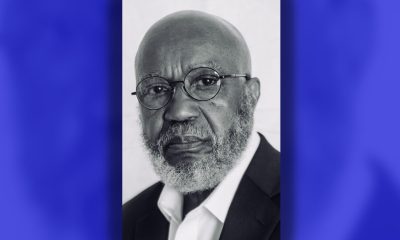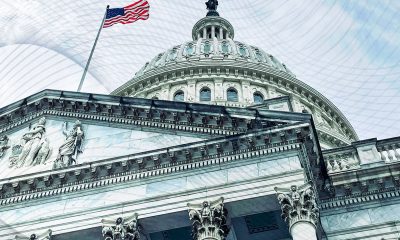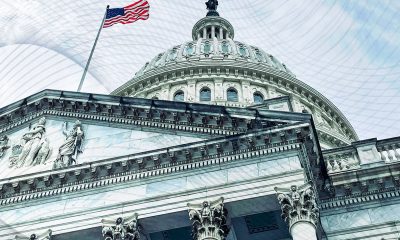National
Scholar Says Race-Neutral Approach Needed for Affirmative Action

Sheryll Cashin, a professor of law at Georgetown University in Washington D.C. advocates for “place-based” affirmative action policies in education. (Freddie Allen/NNPA)
By Freddie Allen
NNPA Senior Washington Correspondent
WASHINGTON (NNPA) – In the wake of unrelenting law suits seeking to abolish affirmative action coupled with nearly half of all universities dropping consideration of race as a factor in college admissions, it is time to shift gears and devise a less objectionable race-neutral approach that will diversify higher education, says a noted Black law professor.
During a recent discussion on affirmative action at the Economic Policy Institute in Washington, D.C. Sheryll Cashin, a professor of law at Georgetown University and author of Place, Not Race: A New Vision of Opportunity in America, said that as long as race-conscious affirmative action remains a factor in college admission, there will always be White students challenging affirmative action.
Cashin, who clerked for U.S. Supreme Court Justice Thurgood Marshall, said “that law or politics will render race-based affirmative action extinct” and argued that it makes “sense to get started on race-neutral reforms that have the potential to create diversity and more social cohesion.”
She said that the percentage of four-year colleges that consider racial, ethnic or gender status in admissions has fallen from about 60 percent to 35 percent.
Others, however, do not favor a switch to de-emphasizing race and point to race-neutral affirmative programs in Texas and California that have not achieved the same results as previous race-conscious approaches. Even Texas’ 10 Percent Plan that guarantees the top 10 percent of each high school graduating class in Texas will be accepted at the University of Texas, the flagship campus, was challenged by a White applicant who had been rejected.
Backed by the Edward Blum’s Project for Fair Representation, a nonprofit group that wants to ban race-, gender- and ethnic-conscious affirmative action, Abigail Fisher a White woman, alleged that the University of Texas at Austin refused to accept her, because she was White, while Black and Latino students that she outperformed were admitted
Admission officials look at factors in addition to grade to determine the composition of an incoming class, not just grades.
In its “Brief of Opposition,” the university said: “The undisputed evidence demonstrated that Fisher would not have been offered fall admission in 2008 even if she had scored a perfect ‘6’ on her PAI – the portion of the admissions process where race is considered as ‘a factor of a factor of a factor.’”
Investigating Fisher’s claims, Pro Publica reported that 42 White students with less impressive grades than Fisher got in compared to just five Black and Latino students with similar academic achievement. Meanwhile, almost 170 Black and Latino students with the same or better grades as Fisher were also turned away.
In the 2012 term, the Supreme Court punted in Fisher v. University of Texas, sending the case back to the lower court for reconsideration. Justice Anthony Kennedy, writing for the 7-1 majority, said: “…Strict scrutiny imposes on the university the ultimate burden of demonstrating before turning to racial classifications, that available, workable race-neutral alternatives do not suffice.”
In other words, the university had the burden of showing that show that gender- ethnicity- and race-conscious affirmative action admission policies are the only way to effectively achieve diversity on campus.
After the case was remanded, U.S. Court of Appeals for the 5th Circuit again ruled in favor of the University of Texas.
In 2003, the Supreme Court issued a pair of rulings involving University of Michigan that many thought had settled the issue.
By a vote of 6-3, the justices outlawed an undergraduate admissions process that, among other things, automatically awarded 20 points to people of color. But on a 5-4, the Supreme Court ruled that race could still be a factor in admissions as long as it is not given too much weight.
However, led by anti-affirmative action foe Ward Connerly, in 2006, Michigan voters banned the use of race in public education and employment, a state constitutional amendment that was later upheld by the Supreme Court.
In the May/June 2014 issue of the Poverty and Race Research Action Council (PRRAC) journal, Cashin, who is also a PRRAC board member, wrote that “place rather than race in diversity programming will better approximate the structural disadvantages many children of color actually endure, while enhancing the possibility that we might one day move past the racial resentment affirmative action engenders.”
Cashin said that when college graduates sequester themselves it can lead to a phenomenon known as “opportunity hoarding,” when a well-resourced, educated ingroup sanctions practices that exclude outgroups.
“And the exclusion does not have to be intentional,” said Cashin.
Cashin said that place, or where you live, locks in advantages and disadvantages that are reinforced over time.
“What has happened increasingly is the affluent and the highly educated are separated from everyone else and that often determines who has access to high quality elementary and secondary education,” said Cashin.
“And when you have geographic concentration of highly educated affluent people in direct horizontal competition with people from lower-income impoverished settings for finite public resources you get savage inequality in the allocation of public resources,” said Cashin. “College-bound students from middle- and low-income environments, particularly African Americans students, disproportionately attend segregated schools and they have to be superhuman to overcome the structural disadvantages of place.”
In Cashin’s article on affirmative action published in the PRRAC journal, she concedes that, “Fewer African Americans may enter elite institutions under an affirmative action system based on structural disadvantage rather than under race-based affirmative action.” However, she argued that the social costs of racial-conscious programs outweigh any marginal benefits when race-neutral alternatives are available.
Lia Epperson, a law professor at the Washington College of Law at American University in Washington, D.C., said that addressing racial disparities is not about totally abandoning policies that use race. She said it’s about the robust enforcement of laws that bar discrimination and inequality, existing compliance reviews that have proven helpful at the elementary and secondary education levels and expanding the role of data collection and the dissemination of data.
“The reality is that we are in a time that is difficult, because we do have this societal indecision with respect to matters of race,” said Epperson, who formerly led the education law and policy group of the NAACP Legal Defense and Educational Fund. “The reality is also that we have a Constitution that supports remedying a history of slavery and Jim Crow. We have to expand our political imagination beyond the reality of the moment.”
Richard Rothstein, a research associate at the Economic Policy Institute said on the panel:
“There’s no doubt that we need to pretend to be colorblind in the current legal climate, but it’s also very important to realize that we have a separate challenge from the challenge of enhancing equity. And that is the challenge of increasing justice.”
Rothstein added, “We have a constitutional obligation to undue centuries of slavery, segregation and exploitation. As recent events have demonstrated to everybody, we have made very little progress in undoing that unconstitutional placement of African Americans in a caste system in this society.”
###
Barbara Lee
Congresswoman Barbara Lee Issues Statement on Deaths of Humanitarian Aid Volunteers in Gaza
On April 2, a day after an Israeli airstrike erroneously killed seven employees of World Central Kitchen (WCK), a humanitarian organization delivering aid in the Gaza Strip, a statement was release by Rep. Barbara Lee (D-CA-12). “This is a devastating and avoidable tragedy. My prayers go to the families and loved ones of the selfless members of the World Central Kitchen team whose lives were lost,” said Lee.

By California Black Media
On April 2, a day after an Israeli airstrike erroneously killed seven employees of World Central Kitchen (WCK), a humanitarian organization delivering aid in the Gaza Strip, a statement was release by Rep. Barbara Lee (D-CA-12).
“This is a devastating and avoidable tragedy. My prayers go to the families and loved ones of the selfless members of the World Central Kitchen team whose lives were lost,” said Lee.
The same day, it was confirmed by the organization that the humanitarian aid volunteers were killed in a strike carried out by Israel Defense Forces (IDF). Prior to the incident, members of the team had been travelling in two armored vehicles marked with the WCF logo and they had been coordinating their movements with the IDF. The group had successfully delivered 10 tons of humanitarian food in a deconflicted zone when its convoy was struck.
“This is not only an attack against WCK. This is an attack on humanitarian organizations showing up in the direst situations where food is being used as a weapon of war. This is unforgivable,” said Erin Gore, chief executive officer of World Central Kitchen.
The seven victims included a U.S. citizen as well as others from Australia, Poland, the United Kingdom, Canada, and Palestine.
Lee has been a vocal advocate for a ceasefire in Gaza and has supported actions by President Joe Biden to airdrop humanitarian aid in the area.
“Far too many civilians have lost their lives as a result of Benjamin Netanyahu’s reprehensible military offensive. The U.S. must join with our allies and demand an immediate, permanent ceasefire – it’s long overdue,” Lee said.
Commentary
Commentary: Republican Votes Are Threatening American Democracy
In many ways, it was great that the Iowa Caucuses were on the same day as Martin Luther King Jr. Day. We needed to know the blunt truth. The takeaway message after the Iowa Caucuses where Donald Trump finished more than 30 points in front of Florida Gov. De Santis and former South Carolina Governor Nikki Haley boils down to this: Our democracy is threatened, for real.

By Emil Guillermo
In many ways, it was great that the Iowa Caucuses were on the same day as Martin Luther King Jr. Day.
We needed to know the blunt truth.
The takeaway message after the Iowa Caucuses where Donald Trump finished more than 30 points in front of Florida Gov. De Santis and former South Carolina Governor Nikki Haley boils down to this: Our democracy is threatened, for real.
And to save it will require all hands on deck.
It was strange for Iowans to caucus on MLK day. It had a self-cancelling effect. The day that honored America’s civil rights and anti-discrimination hero was negated by evening.
That’s when one of the least diverse states in the nation let the world know that white Americans absolutely love Donald Trump. No ifs, ands or buts.
No man is above the law? To the majority of his supporters, it seems Trump is.
It’s an anti-democracy loyalty that has spread like a political virus.
No matter what he does, Trump’s their guy. Trump received 51% of caucus-goers votes to beat Florida Gov. Ron DeSantis, who garnered 21.2%, and former South Carolina Gov. Nikki Haley, who got 19.1%.
The Asian flash in the pan Vivek Ramaswamy finished way behind and dropped out. Perhaps to get in the VP line. Don’t count on it.
According to CNN’s entrance polls, when caucus-goers were asked if they were a part of the “MAGA movement,” nearly half — 46% — said yes. More revealing: “Do you think Biden legitimately won in 2020?”
Only 29% said “yes.”
That means an overwhelming 66% said “no,” thus showing the deep roots in Iowa of the “Big Lie,” the belief in a falsehood that Trump was a victim of election theft.
Even more revealing and posing a direct threat to our democracy was the question of whether Trump was fit for the presidency, even if convicted of a crime.
Sixty-five percent said “yes.”
Who says that about anyone of color indicted on 91 criminal felony counts?
Would a BIPOC executive found liable for business fraud in civil court be given a pass?
How about a BIPOC person found liable for sexual assault?
Iowans have debased the phrase, “no man is above the law.” It’s a mindset that would vote in an American dictatorship.
Compare Iowa with voters in Asia last weekend. Taiwan rejected threats from authoritarian Beijing and elected pro-democracy Taiwanese vice president Lai Ching-te as its new president.
Meanwhile, in our country, which supposedly knows a thing or two about democracy, the Iowa caucuses show how Americans feel about authoritarianism.
Some Americans actually like it even more than the Constitution allows.
About the Author
Emil Guillermo is a journalist and commentator. He does a mini-talk show on YouTube.com/@emilamok1.
Activism
Oakland Post: Week of April 10 – 16, 2024
The printed Weekly Edition of the Oakland Post: Week of April 10 – 16, 2024

To enlarge your view of this issue, use the slider, magnifying glass icon or full page icon in the lower right corner of the browser window. ![]()
-

 Activism4 weeks ago
Activism4 weeks agoOakland Post: Week of March 20 – 26, 2024
-

 #NNPA BlackPress3 weeks ago
#NNPA BlackPress3 weeks agoCOMMENTARY: D.C. Crime Bill Fails to Address Root Causes of Violence and Incarceration
-

 #NNPA BlackPress3 weeks ago
#NNPA BlackPress3 weeks agoMayor, City Council President React to May 31 Closing of Birmingham-Southern College
-

 #NNPA BlackPress3 weeks ago
#NNPA BlackPress3 weeks agoFrom Raids to Revelations: The Dark Turn in Sean ‘Diddy’ Combs’ Saga
-

 #NNPA BlackPress3 weeks ago
#NNPA BlackPress3 weeks agoCOMMENTARY: Lady Day and The Lights!
-

 #NNPA BlackPress3 weeks ago
#NNPA BlackPress3 weeks agoBaltimore Key Bridge Catastrophe: A City’s Heartbreak and a Nation’s Alarm
-

 #NNPA BlackPress3 weeks ago
#NNPA BlackPress3 weeks agoBaltimore’s Key Bridge Struck by Ship, Collapses into Water
-

 Activism3 weeks ago
Activism3 weeks agoOakland Post: Week of March 27 – April 2, 2024



















































